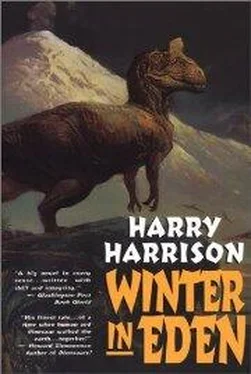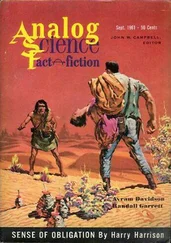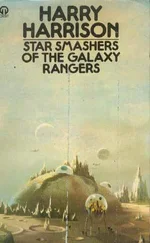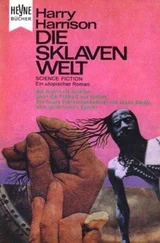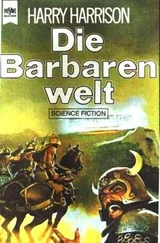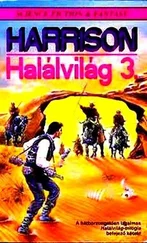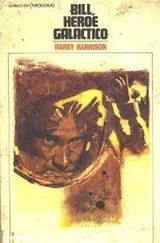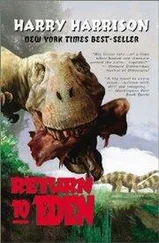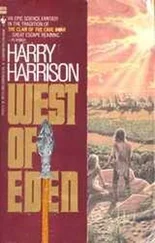Harry Harrison
Winter in Eden
8:And the LORD God planted a garden eastward in Eden; and there he put the man whom he had formed.
16:And Cain went out from the presence of the LORD, and dwelt in the land of Nod, on the east of Eden.
GENESIS
The great reptiles were the most successful life forms ever to populate this world. For 140 million years they ruled the Earth, filled the sky, swarmed in the seas. At this time the mammals, the ancestors of mankind, were only tiny, shrew-like animals that were preyed upon by the larger, faster, more intelligent saurians.
Then, 65 million years ago, this all changed. A meteor six miles in diameter struck the Earth and caused disastrous atmospheric upheavals. Within a brief span of time over seventy-five percent of all the species then existent were wiped out. The age of the dinosaurs was over; the evolution of the mammals that they had suppressed for 100 million years began.
But what if that meteor had not fallen?
What would our world be like today?
Life is no longer easy. Too much has changed, too many are dead, the winters are too long. It was not always this way. I remember clearly the encampment where I grew up, remember the three families there, the long days, friends, good food. During the warm seasons we stayed on the shore of a great lake filled with fish. My first memories are of that lake, looking across its still water at the high mountains beyond, seeing their peaks grow white with the first snows of winter. When the snow whitened our tents and the grass around as well, that would be the time when the hunters went to the mountains. I was in a hurry to grow up, eager to hunt the deer, and the greatdeer, at their side.
That simple world of simple pleasures is gone forever. Everything has changed — and not for the better. At times I wake at night and wish that what happened had never happened. But these are foolish thoughts and the world is as it is, changed now in every way. What I thought was the entirety of existence has proved to be only a tiny corner of reality. My lake and my mountains are only the smallest part of this great continent that borders an immense ocean to the east.
I also know about the others, the creatures we call murgu, and I learned to hate them even before I saw them. As our flesh is warm, theirs is chill. We have hair upon our heads and a hunter will grow a proud beard, while the animals that we hunt have warm flesh and fur or hair. But this is not true of the murgu. They are cold and smooth and scaled, have claws and teeth to rend and tear, are large and terrible, to be feared. And hated. I knew that they lived in the warm waters of the ocean to the south and on the warm lands to the south. They cannot abide the cold so they did not trouble us.
All that has changed so terribly that nothing will be the same ever again. That is because there are murgu called Yilanè who are intelligent just as we Tanu are intelligent. It is my unhappy knowledge that our world is only a tiny part of the Yilanè world. We live in the north of a great continent. And to the south of us, over all the land, there swarm only Yilanè.
And there is even worse. Across the ocean there are even larger continents — and there there are no hunters at all. None. But Yilanè, only Yilanè. The entire world is theirs except for our small part.
Now I will tell you the worst thing about the Yilanè. They hate us as we hate them. This would not matter if they were only great, insensate beasts. We would stay in the cold north and avoid them in this manner.
But there are those among them who may be as intelligent as hunters, as fierce as hunters. And their number cannot be counted but it is enough to say that they fill all of the lands of this great world.
I know these things because I was captured by the Yilanè, grew up among them, learned from them. The first horror I felt when my father and all the others were killed has been dimmed by the years. When I learned to speak as the Yilanè do I became as one of them, forgot that I was a hunter, even learned to call my people ustuzou, creatures of filth. Since all order and rule among the Yilanè come down from the top I thought very well of myself. Since I was close to Vaintè, the eistaa of the city, its ruler, I was looked upon as a ruler myself.
The living city of Alpèasak was newly grown on these shores, settled by Yilanè from across the ocean who had been driven from their own distant city by the winters that grow colder every year. The same cold that drove my father and the other Tanu south in the search for food sent the Yilanè questing across the sea. They grew their city on our shores and when they found the Tanu there before them they killed them. Just as the Tanu killed Yilanè on sight.
For many years I had no knowledge of this. I grew up among the Yilanè and thought as they did. When they made war I looked upon the enemy as filthy ustuzou, not Tanu, my brothers. This changed only when I met the prisoner, Herilak. A sammadar, a leader of the Tanu, who understood me far better than I understood myself. When I spoke to him as enemy, alien, he spoke to me as flesh of his flesh. As the language of my childhood returned so did my memories of that warm earlier life. Memories of my mother, family, friends. There are no families among the Yilanè, no suckling babies among egg-laying lizards, no possible friendships where these cold females rule, where the males are locked from sight of all for a lifetime.
Herilak showed me that I was Tanu, not Yilanè, so I freed him and we fled. At first I regretted it — but there was no going back. For I had attacked and almost killed Vaintè, she who rules. I joined the sammads, the family groups of the Tanu, joined them in flight from the attacks of those who had once been my companions. But I had other companions now, and friendship of a kind I could never know among the Yilanè. I had Armun, she who came to me and showed me what I had never even known, awoke the feelings I could never have known while I was living among that alien race. Armun who bore our son.
But we still lead our lives under the constant threat of death. Vaintè and her warriors followed the sammads without mercy. We fought — and sometimes won, even capturing some of their living weapons, the death-sticks that killed creatures of any size. With these we could penetrate far to the south, eating well of the teeming murgu, killing the vicious ones when they attacked. Only to flee again when Vaintè and her endless supply of fighters from across the sea found us and attacked. This time the survivors went where we could not be followed, across the frozen mountain ranges to the land beyond. Yilanè cannot live in the snows; we thought we would be safe.
And we were, for a long time we were. Beyond the mountains we found Tanu who did not live by hunting alone, but grew crops in their hidden valley and could make pots, weave cloth and do many other wondrous things. They are the Sasku and they are our friends, for they worship the god of the mastodon. We brought our mastodons to them and we have been as one people ever since. Life was good in the Sasku valley.
Until Vaintè found us once again.
When this happened I realized that we could run no more. Like cornered animals we must turn and fight. At first none would listen to me for they did not know the enemy as I did. But they came to understand that the Yilanè had no knowledge of fire. They would learn of it when we brought the torch to their city.
And this is what we did. Burnt their city of Alpèasak and sent the few survivors fleeing back to their own world and their own cities across the sea. This was good for one of those who lived was Enge who had been my teacher and my friend. She did not believe in killing as all the others did, and led her small band called the Daughters of Life, believers in the sanctity of life. Would that they had been the only survivors.
Читать дальше
